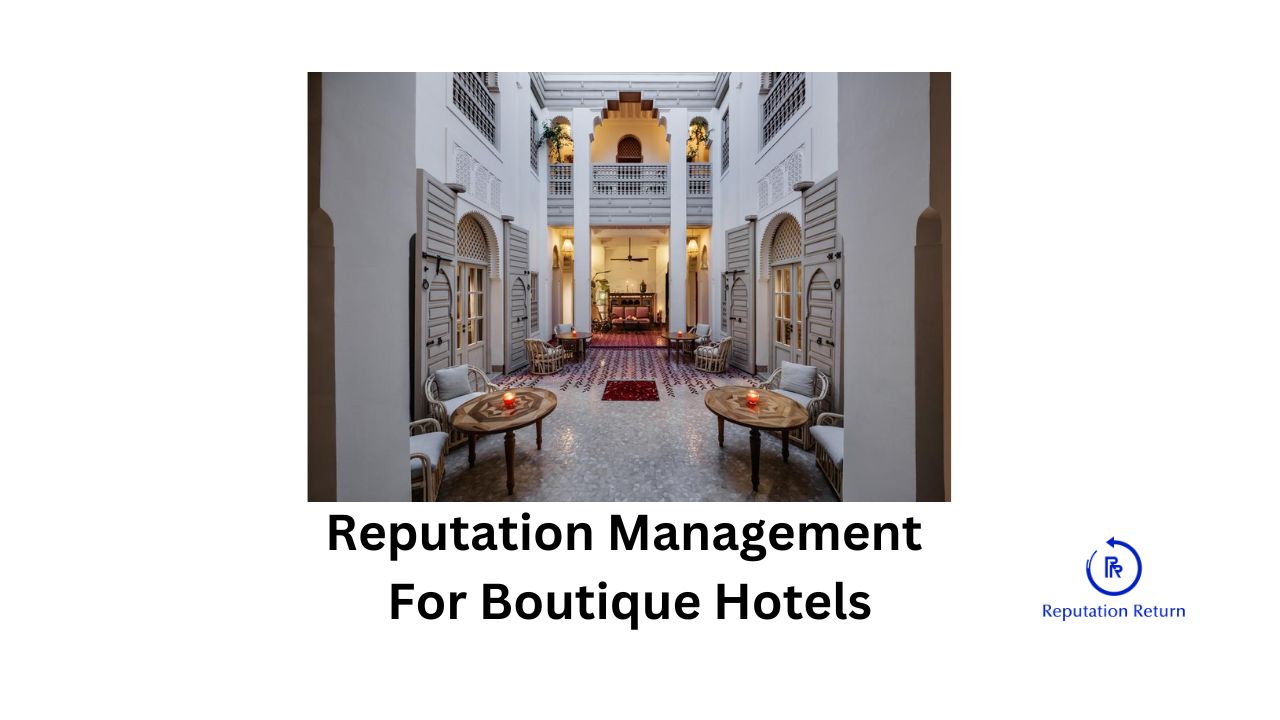In the hospitality industry, a hotel’s reputation is crucial. For boutique hotels, which rely on unique charm and personalized service to attract guests, managing online reputation is particularly vital. With potential customers extensively researching online before making booking decisions, a boutique hotel’s reputation significantly impacts its success. This article delves into why reputation management is essential for boutique hotels, the challenges they face, and effective strategies to maintain a positive online presence.
First impressions are often formed based on online reviews, social media presence, and website content. For example, a guest looking for a boutique hotel might check TripAdvisor, Google, or Yelp. If they encounter a single negative review or an inactive social media account, they might be deterred from booking. On the other hand, a strong online presence with positive reviews and active engagement can attract more bookings and foster loyalty. We help you with all of these aspects of your PR, brand and reputation management.
Online reviews hold significant power. We can help you optimize reviews, too. According to a BrightLocal survey, 87% of consumers read online reviews for local businesses, and 49% trust these reviews as much as personal recommendations. For boutique hotels, positive reviews on platforms like TripAdvisor and Google are crucial for building trust and attracting new guests. Highlighting unique guest experiences through reviews can differentiate a boutique hotel from larger competitors, emphasizing personalized service and unique ambiance.
Competition with larger, well-known chains is a constant challenge for boutique hotels. A stellar online reputation helps level the playing field. By maintaining positive reviews and engaging social media presence, boutique hotels can showcase their strengths, such as personalized services and unique experiences. For instance, a boutique hotel that frequently shares guest testimonials and behind-the-scenes looks on Instagram can create a compelling narrative that attracts potential guests.
Handling negative reviews is another significant challenge. Negative reviews can arise from genuine grievances or unreasonable expectations. Boutique hotels must address these reviews promptly and professionally to demonstrate a commitment to guest satisfaction. For example, if a guest complains about the cleanliness of a room, the hotel should respond publicly, apologize, and explain the steps taken to rectify the issue. Ignoring or mishandling negative feedback can harm a hotel’s reputation and deter future guests.
Consistent brand messaging across various online platforms is essential but can be challenging. Inconsistencies in branding can confuse potential guests and undermine trust. A cohesive strategy ensures that the boutique hotel’s unique brand and values are effectively communicated. For example, using the same color scheme, logos, and tone of voice across the hotel’s website, social media, and advertising materials can reinforce brand identity.
Active social media engagement is crucial but time-consuming. Boutique hotels must balance promoting their services, engaging with followers, and addressing feedback. Neglecting social media can lead to missed opportunities for guest interaction and brand promotion. For instance, a boutique hotel that regularly updates its Instagram with photos of its rooms, amenities, and events can attract and engage followers, creating a loyal customer base.
Encouraging positive reviews from satisfied guests can significantly enhance a boutique hotel’s online reputation. Simple prompts at check-out or follow-up emails can effectively solicit feedback. Highlighting positive reviews on the hotel’s website and social media platforms can reinforce a positive image. For example, sharing a guest’s glowing review on Facebook, along with a photo of the guest enjoying their stay, can attract potential customers.
Responding promptly to reviews, both positive and negative, shows that the hotel values guest feedback. A thoughtful response to negative reviews can mitigate damage by addressing concerns and offering solutions. Publicly acknowledging positive reviews fosters goodwill and encourages more guests to share their experiences. For instance, if a guest praises the hotel’s breakfast service, the hotel can thank the guest and mention any new breakfast items being introduced.
Monitoring online mentions using reputation management tools helps boutique hotels stay informed about guest feedback. Tools like Google Alerts, Mention, and Hootsuite can track reviews, social media posts, and blog mentions, allowing hotels to respond promptly and appropriately. For example, setting up Google Alerts for the hotel’s name can notify the management of any new online mentions, enabling quick and effective responses.
Maintaining a strong social media presence is essential. Regularly updating social media accounts with engaging content helps maintain visibility and attract potential guests. Sharing guest experiences, behind-the-scenes looks, and special promotions can humanize the brand and foster a loyal following. For example, posting photos of a guest enjoying a themed event at the hotel can create excitement and interest among followers.
Search engine optimization (SEO) ensures that the hotel appears in relevant search results. By optimizing the hotel’s website and online content with relevant keywords, boutique hotels can increase their visibility and attract more bookings. For instance, using keywords like “luxury boutique hotel in [city]” can help the hotel rank higher in search engine results, attracting more potential guests.
Implementing a crisis management plan prepares boutique hotels for potential PR issues. This plan should include strategies for addressing negative press, handling social media backlash, and communicating with guests during crises. For example, if a negative news story about the hotel emerges, having a plan in place ensures a swift and effective response, minimizing damage to the hotel’s reputation.
Hiring a professional reputation management service can provide boutique hotels with expert strategies and tools to manage their online presence effectively. These services offer comprehensive solutions, from monitoring online mentions to optimizing SEO and handling PR crises. For example, a reputation management service can help a boutique hotel develop a consistent brand message, monitor online reviews, and manage social media accounts, ensuring a positive online presence.
For boutique hotels, reputation management is not just an option—it’s a necessity. In a competitive market, a strong online reputation can attract guests, build loyalty, and drive bookings. By implementing effective reputation management strategies, boutique hotels can maintain a positive image, differentiate themselves from competitors, and ensure long-term success.

